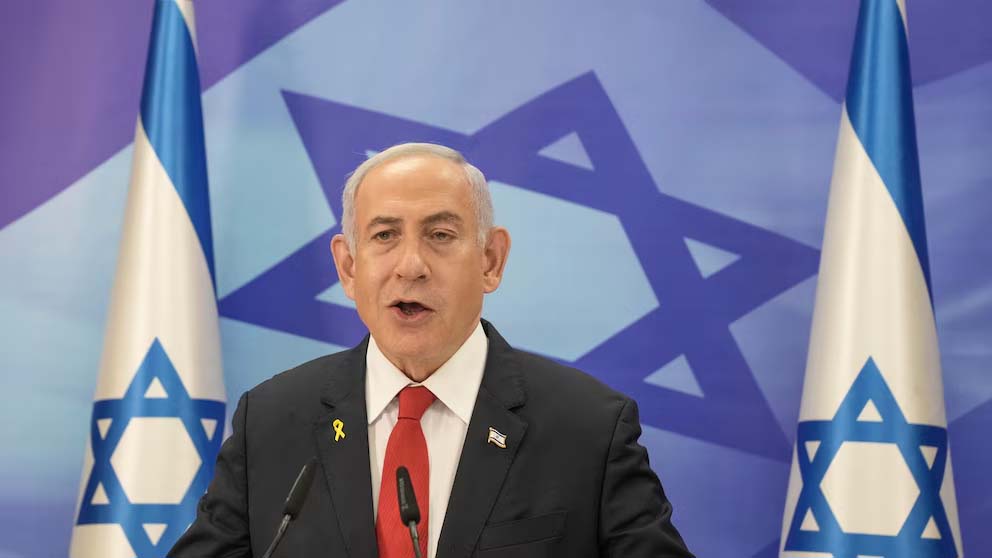TEL AVIV, Dec 29: Israeli Prime Minister Benjamin Netanyahu is set to undergo prostate removal surgery on Sunday, as confirmed by his office. This procedure takes place amidst his management of various crises, including the ongoing conflict in Gaza and his own trial related to accusations of corruption.
At 75, Netanyahu is part of a growing number of older global leaders—such as US President Joe Biden, 82, and President-elect Donald Trump, 78—whose health and physical fitness are under scrutiny due to their age and its potential impact on their leadership capabilities.
Netanyahu has faced several health challenges in recent years and has taken measures to present himself as a vigorous, healthy leader. In the midst of his trial this month, he claimed to be working 18-hour days, despite those hours being often accompanied by a cigar. However, with 17 years as Israel’s longest-serving leader, such a demanding schedule could affect his health.
The scheduled procedure has already created consequences: Netanyahu’s attorney, Amit Hadad, informed the court that the Israeli prime minister will be fully sedated during surgery and will require hospitalization for “several days,” requesting a cancellation of his testimony over the next three days. The court has consented to this request.
An acting prime minister will assume Netanyahu’s duties while he undergoes surgery, although it has not been disclosed who that will be. The official who provided details wished to remain anonymous as they were not authorized to share this information with the media.
Given the volatile situation in the region, Netanyahu’s health during wartime raises concerns among Israelis and the international community alike.
Prostate complications are common among older men, but recovery from the surgery is generally swift.
According to his office, Netanyahu was diagnosed with a urinary tract infection last Wednesday, which was linked to a benign enlargement of his prostate. The infection was treated successfully with antibiotics, but the surgery on Sunday will remove his prostate.
Dr. Shay Golan, who heads the oncology urology service at Israel’s Rabin Medical Center, explained to Israeli Army Radio that complications arising from prostate enlargement are typical for men in their 70s and 80s. He noted that such an enlargement can obstruct the bladder’s proper emptying, leading to urine build-up and potential infections or other complications. After medical intervention, surgery to remove the prostate may be advised to prevent future blockages.
In Netanyahu’s case, since the prostate is non-cancerous, Golan indicated that doctors would likely perform an endoscopic procedure, which uses small instruments inserted into the body rather than making incisions in the abdomen to access the prostate.
This surgery is expected to last about an hour, with a quick recovery process. Patients typically can engage in normal activities without significant limitations after one to three days of catheter use post-procedure.
Netanyahu has a history of health concerns, including a heart condition.
The prime minister maintains that he is in excellent health, and his office has focused on fostering a public image to support this claim. They circulate videos of him visiting war zones in full protective gear alongside military personnel, or engaging with defense officials on rugged hilltops while dressed in modern attire.
However, this image was disrupted last year when it was revealed that he had been diagnosed with a heart condition that he had conceconcealed from the public for years. Following a fainting incident, he was urgently fitted with a pacemaker to regulate his heartbeat, at which point staff at Sheba Medical Center disclosed his history of irregular heartbeats.
This disclosure coincided with a period of major anti-government protests, fueling public anger and distrust amid extreme political divisions within Israel.
In another instance last year, Netanyahu was hospitalized due to dehydration and remained there overnight, which caused a delay in his weekly Cabinet meeting.
Earlier this year, he also underwent surgery for a hernia, during which he was placed under general anesthesia. His close ally, Justice Minister Yariv Levin, temporarily filled in as acting prime minister during that time.
Netanyahu’s prostate surgery occurs during a particularly tumultuous period in the region.
As the leader of Israel, Netanyahu occupies a critical position amid global events that are reshaping the Middle East landscape. The rapid developments over the past 14 months mean that even a brief incapacitation could have significant implications in the ongoing regional upheaval.
His hospitalization coincides with international efforts to broker a ceasefire between Israel and Hamas while violence persists in Gaza, compounded by intensifying conflict with Iran-backed Houthi rebels in Yemen.
This health issue highlights not only Netanyahu’s age but also the more general prevalence of prostate complications among older men, which are frequently easy to manage. Nevertheless, they can significantly impact perceptions—especially for a leader who needs to project strength in a context filled with persistent threats, both domestically and from adversaries aiming to exploit vulnerabilities in Israel’s leadership. (AP)


Leave a Reply